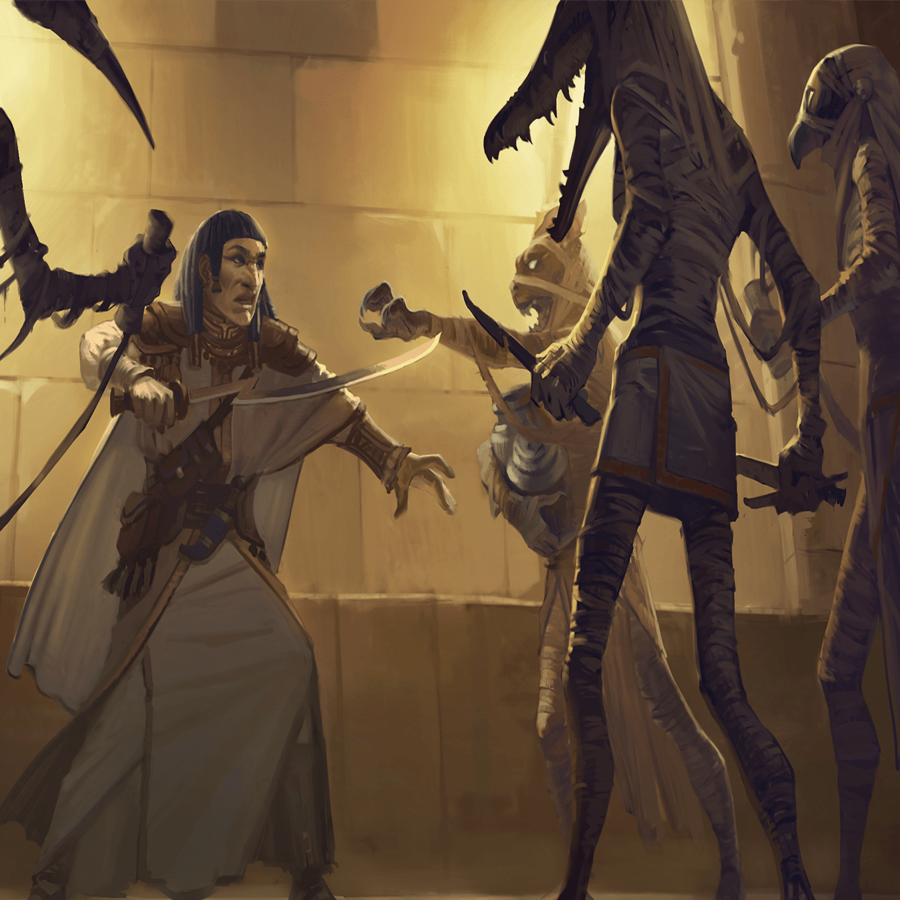5 Sneaky Ways D&D Players Cheat

Written by Luke Hart
Every game master will have to deal with an RPG player who cheats at one point or another. Today, we’ll look at WHY players cheat, HOW they cheat, and WHAT game masters can do about it. Cheating can breed resentment and other issues at the game table. If a game master and other players just ignore it and do nothing, it could cause problems.
By the way, if you’re looking for a low-level, fifth-edition adventure module, check out Into the Fey. It’s designed for levels 1 to 5 and features lots of new fey creatures and their tricksy plots. Pick up the Into the Fey Ultimate Bundle to get the hardcover, the PDF, digital maps, and digital tokens!
Watch or listen to this article by clicking the video below.
Why Do Players Cheat?
According to the National Institute of Health, there are three main reasons why players cheat in games.
#1 Competitive Motivation
Basically, higher degrees of competitive pressure or motivation can induce individuals to engage in unethical behavior. An overemphasis on success, an obsession with winning, or a fear of failure all contribute to competitive motivation.
Now, this is more common with older players who remember more traditional play styles where death was far more likely in the game, experience points were based on winning fights, getting gold, and other competitive factors, and whose games had less of a narrative focus and more of a “kill monsters, get treasure” mentality.
#2 Low Self-Esteem
People with low self-esteem are vulnerable to problematic situations due to their lack of self-confidence. Essentially, low self-esteem results in people wanting to look good or competent among their peers out of fear of being judged. For instance, the impact of low self-esteem in sports is known to be a major factor in drug use in sports and in predicting cheating.
#3 Aggressive Personalities
Aggression is cited as a major psychological variable that causes antisocial behaviors, including cheating. People who show higher degrees of aggression are more likely to have low psychological barriers to antisocial behaviors, throwing aside ethical behavior to fulfill their own desire to prove their superiority to others.
How Do Players Cheat?
#1 Fudging Rolls
This is the most common form of cheating in my experience, and these are the signs of dice fudging that you should look for:
Unreadable dice. These include dice with numbers that aren’t inked, tiny dice, those with weird shapes that make the top number harder to discern at a distance, and so on. For instance, my player, Joe, has Call of Cthulhu dice that are practically impossible to read, even for him when he’s staring right down at them. Now, I would never accuse my dear friend Joe of cheating, of course . . . I’m just giving an example.
The “quick pick up.” This is when a player rolls their dice and then scoops them up to closely examine the number before saying the result. With this, hesitation is often a sign of lying.
The wall of obscurement. I once had a player who built a veritable castle around his dice rolling area with books, energy drinks, and other objects that completely hid his dice from anyone else at the table. Consequently, wouldn’t you know it, his dice rolls were almost always super high. I cannot tell you how often he would “drop a 17” or higher. The wall of obscurement applies to rolling dice in any manner that causes them to land so that the number can’t be seen by other people at the table.
Rolling “recreationally.” This player rolls dice constantly when it’s not their turn, so they can take a good roll when it falls as their “real roll.” Now, I’ve never seen this pulled off successfully, as it is amazingly suspicious when a player is just constantly rolling dice and then suddenly declares an action, saying, “I’d like to do X, and I rolled a 24 for it.”
#2 Conveniently Forgetting Limitations on Spells and Abilities
This sin of omission is harder to spot but can be pretty common. These are the players that “forget” that a spell has a saving throw at the end of each turn to end it, forget to roll Concentration checks, or ignore the downsides of things, such as a Frenzy Barbarian ignoring the exhaustion that comes after a frenzied rage. This also includes conveniently forgetting rules that limit a character’s abilities, such as the limit on the number of spells that can be cast per turn, only being able to Shadow Step into areas of dim light or darkness, and the like. Believe it or not, the same player who always had his Wall of Obscurement was guilty many, many times of doing this—and those are just the times I caught him.
Now, yes, I understand that sometimes people make mistakes, but when they become habitual and are accompanied by other problematic behaviors, it’s a sure sign that it’s intentional.
#3 Improperly Tracking Expendable Resources
This list includes not tracking hit points and ammunition (in games where this is expected), not “spending” their gold when they buy stuff, not marking off spell slots when they’re used, or tracking special abilities with limited uses, such as rages, ki points, and superiority dice. It also includes miscounting item charges and not removing potions from their inventory after use—the list goes on and on and on.
#4 Changing Things Around on Their Character Sheets
Players will shift points around to account for places where they were weak in previous battles or fudge ability score rolls (if you roll them in your game), either during character creation or after, by changing their character sheets—by the way, when I used to have players roll up their ability scores, I would always observe the rolls. Always. They also change prepared spells (or known spells). Again, the ways are numerous.
#5 Metagaming
Metagaming occurs when players use out-of-character knowledge—things they know as players but that their characters wouldn’t know—in the game. There are a few different ways I’ve seen metagaming manifest.
The first is using things the player knows about the rules that their character wouldn’t know. For instance, if the player knows all about trolls, but their character doesn’t, and they have their cold-based sorcerer conveniently cast their only fire-based spell, well . . . that’s probably metagaming. Or if an enemy wizard casts a hypnotic pattern, and one of the players says, “Guys, that’s a concentration spell. We all need to focus fire so we can break his concentration.” Well, if their character, who happens to be a barbarian, doesn’t know that, that’s metagaming.
If an enemy casts darkness with a 20-foot radius, and you draw the spell effect on the board, then the paladin conveniently runs in just the right direction to most quickly escape the darkness, even though they can’t see which route is fastest? Yep, metagaming. An obvious one is a player reading published adventures ahead of time so they know the secrets of the adventure and can use that information to their benefit during gameplay.
Now, what I’ve noticed about this type of metagaming is that players are very quick to say things like, “Well, trolls are probably common knowledge, so most people know to use fire.” Or, “Most characters should know that many spells are concentration, so even a barbarian should know that.” However, those are just a couple examples. When practically everything can be justified one way or another, well, we have a term for that: cheating and trying to get away with it.
The next type of metagaming I’ve seen is a player or character using knowledge that the GM gave to another player’s character. This often happens when a player assumes that the other character instantly shared that information without asking or that if one person noticed something, they noticed it too. This is especially heinous (in my opinion) when the characters aren’t even in the same location.
The last major type of metagaming is metagaming based on dice rolls. For instance, remember when the rogue searched for traps on the door but rolled a 3 on the die? Then the high Perception cleric went over to check for traps “just in case?” However, when the rogue rolls 15 or above, no one ever checks “just in case.” Or when the rogue waits until you’ve stated how much damage an enemy’s attack has done before they decide to uncanny dodge? Yeah, those are both metagaming.
What Can You Do about Cheating Players?
#1 Do Not Punish the Player by Punishing Their Character
This involves things like killing or penalizing their character or otherwise making a public display of discipline. Do you really think that’s going to help? It’s far more likely to push them to worse behavior, in my opinion.
#2 Reward Trustworthy Behavior
In my games, when a player does something honestly when they might have otherwise cheated or omitted important information, I make sure to publicly acknowledge and thank them. A classic example is Concentration checks. I often forget when a character is concentrating on a spell, so when a player rolls the check without my asking and announces the result, I’m sure to thank them for it. Sometimes, I’ll give the player a reward for honest behavior. Inspiration or hero points work great. This encourages players who might otherwise cheat to be honest instead, as doing so is rewarded.
#3 Make Sure They’re Actually Cheating, Not Genuinely Making a Mistake
This is a tough one, for sure. I mean, some players do have dice that are on fire. Players do screw up what their spells and abilities do from time to time. Sometimes, the cold-based sorcerer does cast fire on the troll because they had just learned the spell and were itching to use it. The trick here is to watch for repeated offenses. When you start to notice patterns, that’s when cheating becomes a higher probability.
#4 Talk to the Player!
Now, this will probably be a difficult conversation, but it’s a necessary one. Essentially, you want to tell the player what you’ve observed, explain that you feel not everything is on the up and up, and ask them to change their behavior. You want to try to do this as non-confrontational as possible, but that’s nearly impossible because it is a confrontation. You also want to try to make this a conversation about more than just you laying down the law. Tell them what you’ve observed and that you feel not everything is on the up and up. Then, ask them for their version of events and how they feel about the situation. However, at the end of the day, you need to request they change their behavior or otherwise implement a solution.
When you do this, don’t confront them in front of the other players. That could directly trigger all three psychological reasons for cheating and will probably be met with resistance. Furthermore, embarrassment could lead to the player leaving the game, which may not be the desired outcome.
However, if that doesn’t work for you—for instance, maybe you just don’t feel comfortable confronting them in private, or it’s not possible—consider talking to the entire table without directly calling the player out. For instance, to deal with a player who is fudging dice, you might introduce a communal dice tray and ask that all players roll their dice there so that all can see. Admittedly, that’s a less-than-optimal solution, in my opinion, but sometimes something is better than nothing.
Always try to deal with the cheater’s behavior first before making more work for yourself as a game master!
You see, many of us are so averse to confrontation that we will happily accept all manner of extra work instead of dealing with the root cause of the problem. These include such things as keeping copies of the characters’ sheets (which is also good for game/encounter planning purposes anyway, so perhaps not a big deal), as well as maintaining a basic understanding of how the character classes and spells work, so you’re not just blindly trusting the player, and looking them up yourself during a game if you’re not sure. For what it’s worth, trying to have a basic understanding of character abilities and spells isn’t a bad idea whether or not you’re dealing with a cheater.
Other ways we make more work for ourselves is by using item cards and requiring players to hand in expended items, having a trustworthy player track gold and treasure for the entire party (this can be a pain in the butt, but you’ll usually find one player willing to do it), putting a large dice tray in the middle of the table and having all players roll in that tray, and changing published content to prevent metagaming. Remember, the GM can change anything, including customizing adventures and monsters to make player knowledge obsolete.
Now, I really don’t recommend any of these as ways to deal with a cheater—it’s always better to address the root cause rather than put bandages on the issue, especially when these bandages create more work for the game master. However, if nothing else works and you don’t want to kick the cheater out of your game, you’re down to the last resort.
Asking the player to leave the game is a last resort.
If the player is a friend, this can be very difficult. Shoot, it could even compromise the friendship, I get it. However, it might come down to either that or continually dealing with a bad player. If that player causes the other players to leave, well, you have no game.
Asking a player to leave becomes even more difficult if they have a connection to another player, such as a spouse or significant other. I mean, you could lose two players for the price of one.
Now, I must say, asking a player to leave is a lot easier if you play public games for random people because no previous relationship exists. However, it’s still not easy.
I think that asking a player to leave is a last resort. Still, some people just can’t be “fixed,” and you’ll have to choose between dealing with ongoing issues or doing everyone—yourself and the other players—a favor by booting the problematic player. My suggestion is to cowboy up and get ‘er done.
A 5e Adventure Module Filled with Fey Creatures and Their Tricksy Plots!
If you’re looking to start up a new 5e campaign or reboot your current one, Into the Fey may be exactly what you need. Designed for levels 1 to 5, Into the Fey contains everything you need to start playing:
- 11 fey-themed adventures
- over 40 new fey creatures
- the fully fleshed-out starting town of Aeredale
- regional information and maps for both the material and fey planes
Pick up the Into the Fey Ultimate Bundle to get the hardcover, the PDF, digital maps, and digital tokens.
Starting a new campaign can be tons of work; let Into the Fey do some of the heavy lifting for you!
-
Posted in
Game Master How-To Articles







